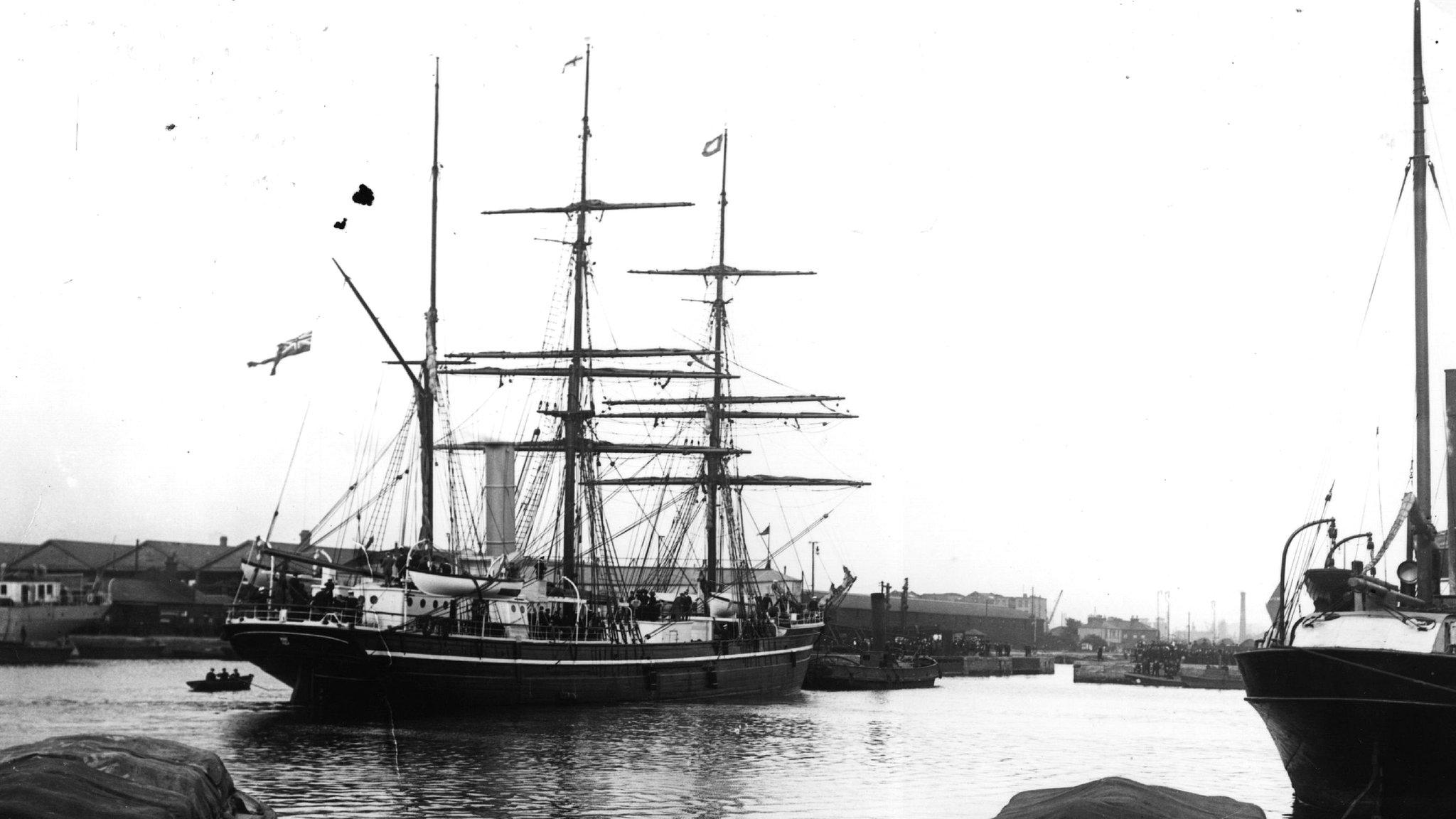Scott of the Antarctic: Edgar Evans' reputation restored by wife, author says
- Published
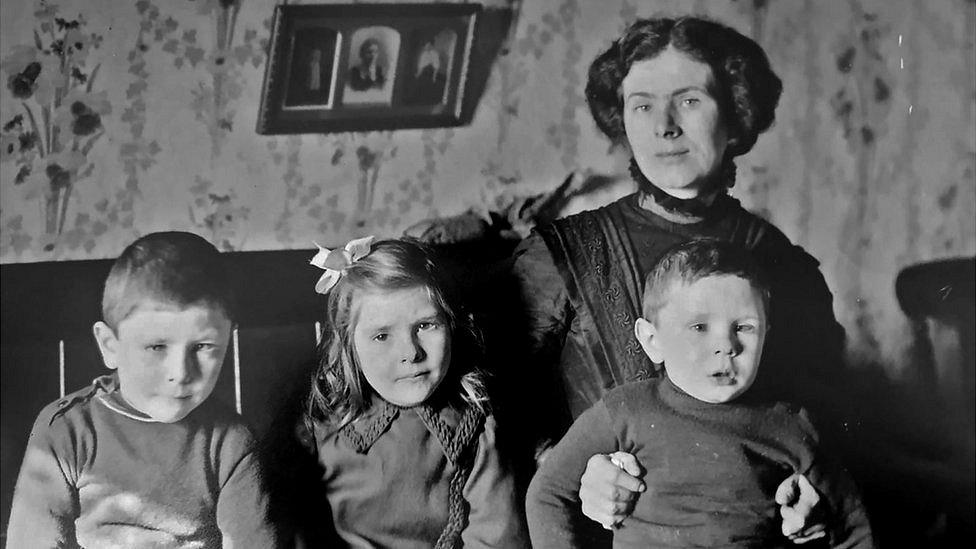
Lois Evans with her children
The story of a woman who restored her husband's reputation, after he was blamed for Captain Scott's doomed mission to the South Pole, has been highlighted by a historian.
Most accounts of Scott's ill-fated Terra Nova expedition end with his team's death on their return journey.
Historian Anne Fletcher has set out to tell the story of the women who were left behind for decades afterwards.
Her book Widows of the Ice, The Women that Scott's Antarctic Expedition Left Behind, looks at the life of Lois Evans, who married Petty Officer Edgar Evans, from Middleton, near Swansea.
Despite her working class background Lois "stood her ground" and defended her husband to a hostile and patronising press.
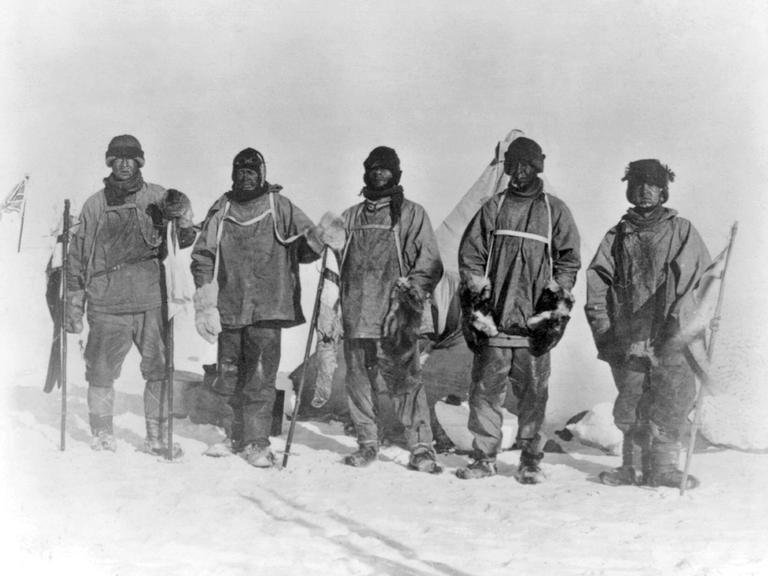
The five-man team arrived at the South Pole only to find that a Norwegian explorer had got there first

Evans was born in the Gower village of Middleton on 7 March 1876.
Lois (nee Beynon), was born in Swansea three years later, and was a cousin of Evans.
Anne Fletcher speculates that the two must have known each other from childhood, playing together while the adults ran the family business, Middleton's Ship Inn.
Evans joined the Royal Navy aged 15. By 1899 he had been transferred to HMS Majestic where he served under the ship's torpedo officer, then-Lieutenant Robert Falcon Scott.
In 1901 Scott hand-picked Evans for his first polar mission aboard RSS Discovery.
After reaching Victoria Land on the western edge of Antarctica, he was highly commended on their return and promoted to Petty Officer.
By this stage Lois's parents were running the pub and her and Evans' romance began in earnest.
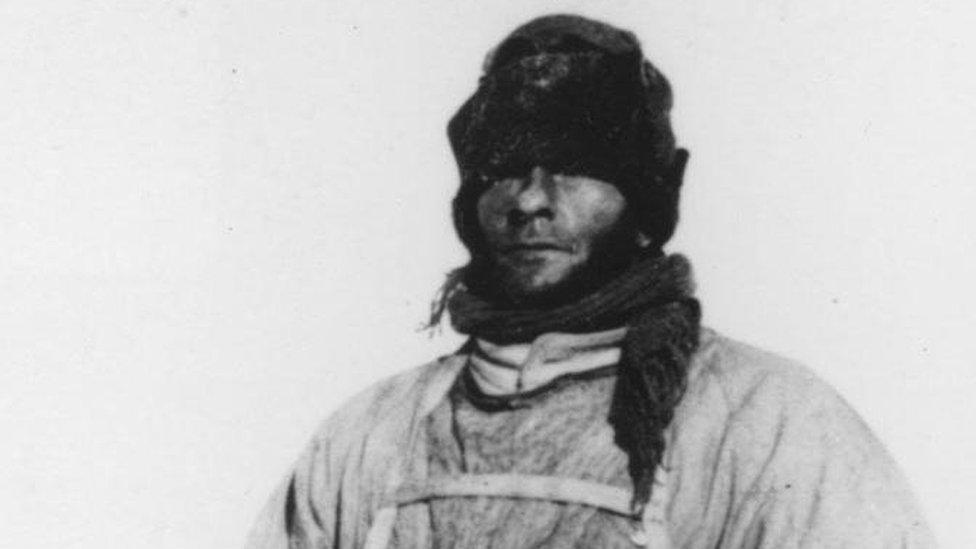
Edgar Evans was unfairly blamed for the failure of the expedition according to historian Anne Fletcher

Fourteen weeks after his return they were married on 13 December 1904 at Rhossili's tiny medieval church, St Mary's.
They had their reception in Middleton's Picknick Hall, next to the Ship Inn.
"Five days after their wedding, Lois accompanied Evans to London, where the crew of Discovery had been invited to an investiture where King Edward VII presented them with the new Polar Medal in recognition of their service under conditions of extreme hardship," said Ms Fletcher
She added: "After that they set up home in Portsmouth, and Evans was land based for the next five-and-a-half years.
"It seems to have been a happy marriage, although the Polar storm clouds were never too far away from their relationship."
Ms Fletcher believes the couple had a marriage pact that if Scott came calling again, Lois would give her blessing and allow Evans to join him.
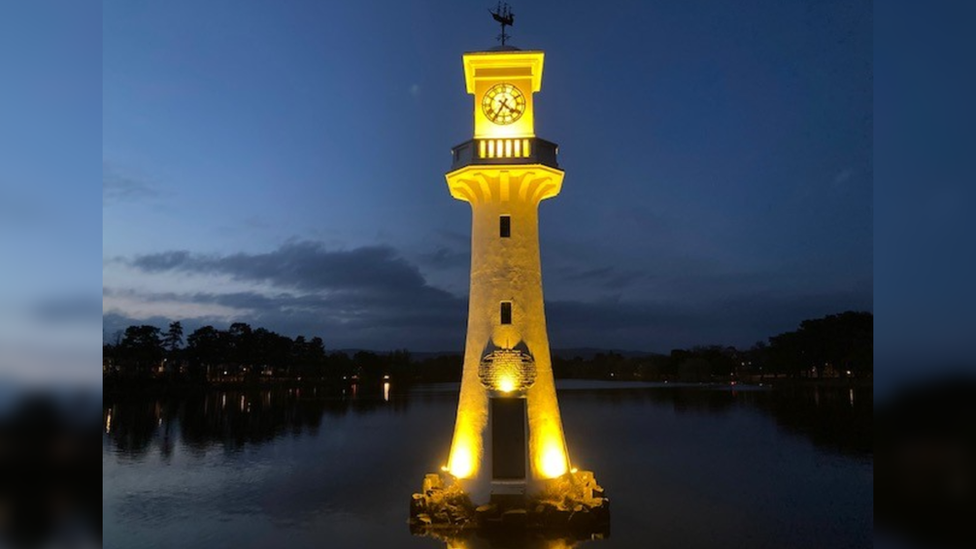
The memorial to Captain Scott and his men, in Roath Park, Cardiff
That call eventually came in March 1910, when Scott selected Evans for his Terra Nova mission to the South Pole.
By this stage, some speculated that a comfortable life on land could have taken the edge off his exploration zeal.
Scott's biographer, Roland Huntford, described Evans as "a huge, bull-necked beefy figure" and a "beery womaniser" who was "running a bit too fat" by the time of Scott's second expedition aboard Terra Nova.
Huntford's account has however been widely discredited in recent years and the Evans family successfully sued him for his comments.
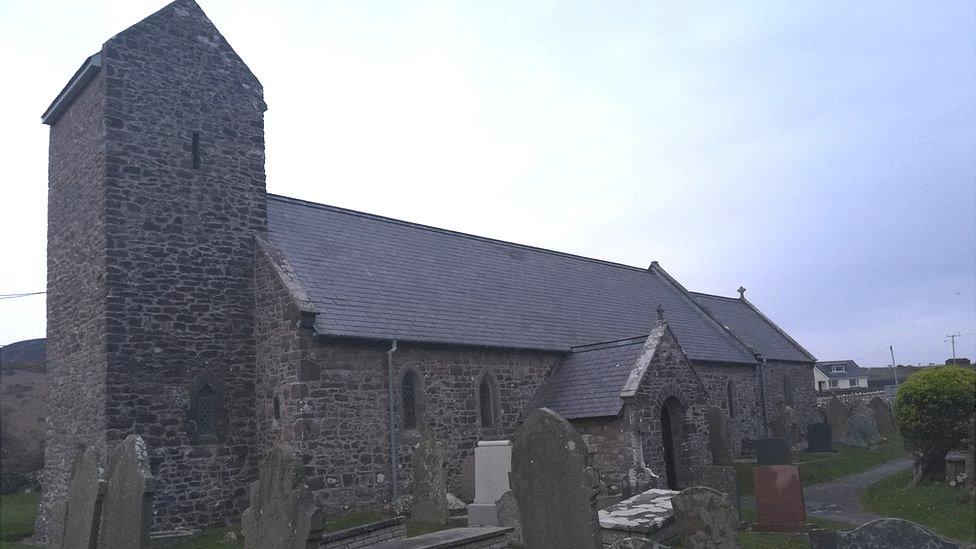
Lois and Edgar married at St Mary's Church in Rhossili on 13 December 1904
Although the accusations of womanising may have contained a grain of truth, as Ms Fletcher writes that Evans fathered twins through an affair with the widow of a fellow sailor.
Yet she also points to Scott's own letters to vouch for the quality of Evans's work on the expedition.
He wrote, "a giant worker, he is responsible for every sledge, every sledge-fitting, tents, sleeping-bags, harnesses, and when one cannot recall a single expression of dissatisfaction with any one of these items, it shows what an invaluable assistant he has been".
Nevertheless the negative myths persisted for decades.
Evans was the first of the group to fall ill on their return from the South Pole, cutting his hand, being concussed after a fall into a crevasse, and developing severe frostbite to his fingers, toes and face.
Some blamed his lack of fitness for slowing down the group's return to base camp and endangering his colleagues.
'Degree of privacy'
Lois Evans' experience following the failed mission was different to that of Scott's wife Kathleen and Oriana who was married to Dr Edward Wilson, due to her working class background according to Ms Fletcher.
She said: "Whilst the other two, Kathleen in particular, were society figures, and so were afforded a degree of privacy, protection and financial security, Lois was considered fair game by the press.
"After news of the party's death broke, she was hounded by reporters," she said, adding: "Whilst the pressure must have been unbearable while she grieved, in some ways Lois needed the press more than the other two, because she was determined to restore Edgar's reputation.
"He'd been unfairly blamed for the failure of the expedition in some quarters," said Ms Fletcher.
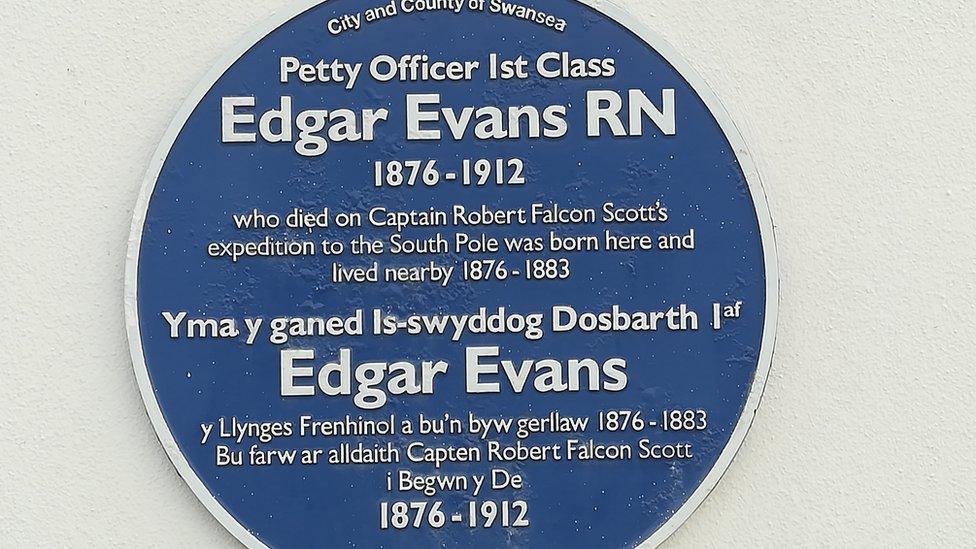
A blue plaque in honour of Edgar Evans has been put up on Middleton Hall Cottage, where he was born
Lois became so impoverished she was forced to sell Evans's cherished Polar Medal.
"Eventually Lois was forced to leave Portsmouth and return to Gower as she could no longer support herself and her children," said Ms Fletcher.
"It was there on 11 Feb 1913 that a reporter from the Daily Telegraph found her, followed by those from the South West Daily Post and Western Mail.
"Lois had only just heard of Edgar's death and found herself being interviewed on her doorstep by the press.
"She stood her ground admirably, describing Edgar as 'such a brave, strong man … and he was kind and such a devoted father' but it took a long time for the accusations to go away" she added.
But the public needed someone to blame. As he was the most junior and the only working-class member of the team, Evans fitted the bill perfectly.
One reporter wrote that he found Lois to be "quite a superior and refined little woman".
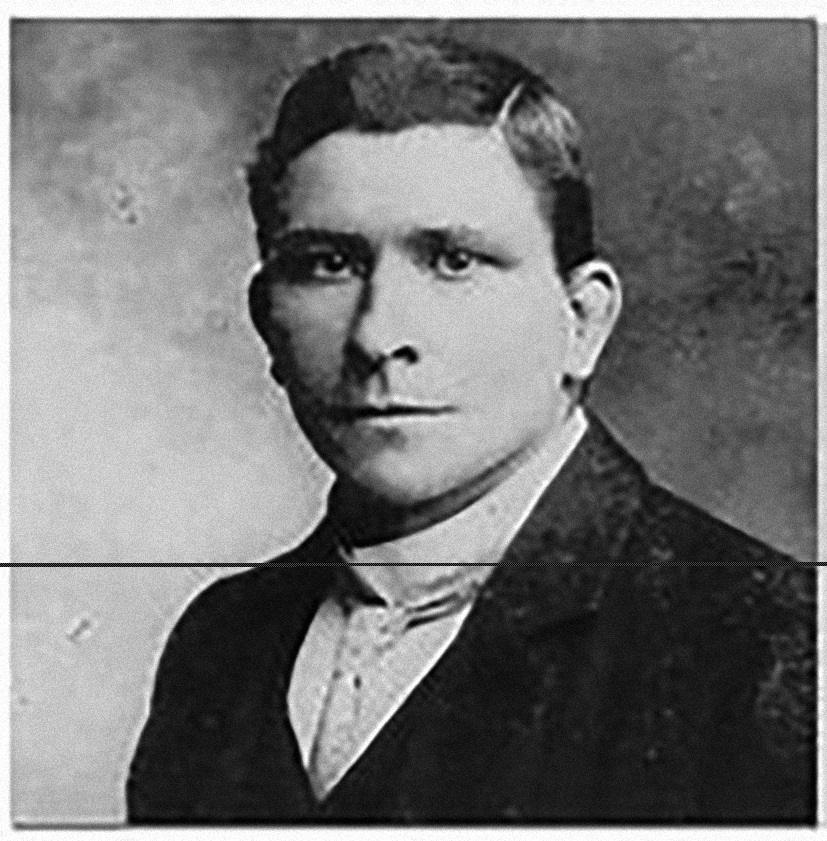
A portrait of Edgar Evans from 1904
"This patronising comment says much about his preconceptions of a working-class family in rural Wales.
"But it also demonstrates just how remarkable this young woman from Gower was when thrust into the spotlight in the most brutal of personal circumstances," said Ms Fletcher.
Lois moved to Swansea at the end of World War One and in 1929 secured a council house for her and her children, which she named Terra Nova.
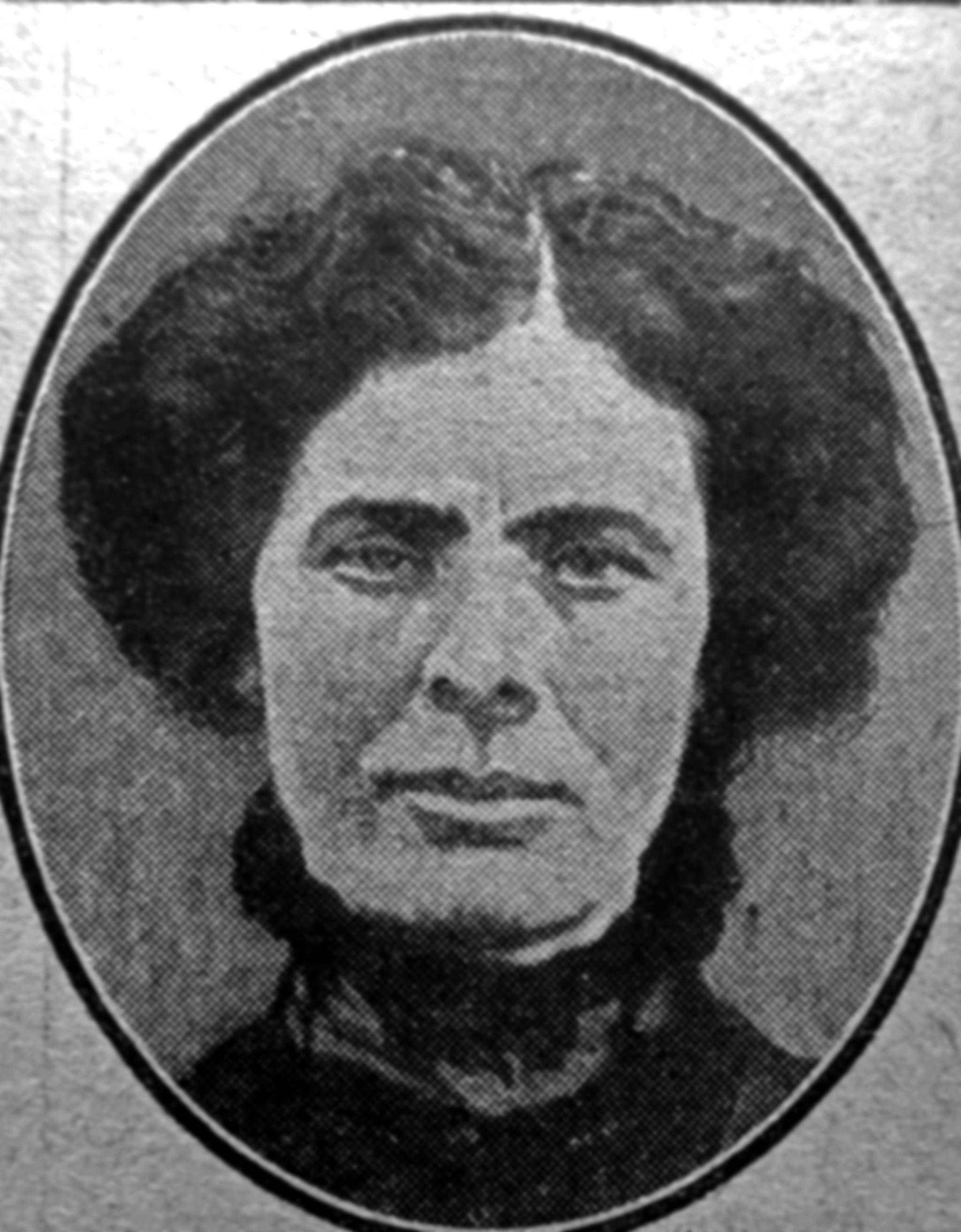
In 1948 she attended the premiere of "Scott of The Antarctic" with her eldest son Norman, a film which went some way to setting the record straight through James Robertson Justice's powerful depiction of Evans.
Lois paid for a small memorial to her husband at St Mary's, the church where they had married, but it wasn't until 1994 that an official memorial was raised to Edgar in Wales.
Commissioned by the Captain Scott Society of Cardiff, the white marble bust was sculpted in Gower and presented to the City of Swansea.
Lois never remarried and died in Morriston in 1952.

LESSONS FROM LOCKDOWN: How has the experience of lockdown changed us?
LAST CHANCE TO SAVE: Will Millard explores some of Wales’s hidden historic buildings

Related topics
- Published9 March 2022
- Published16 August 2012
